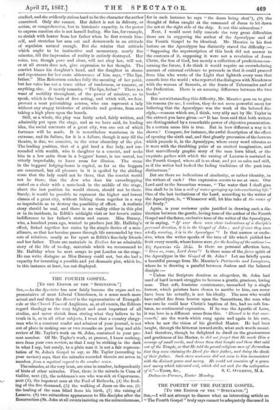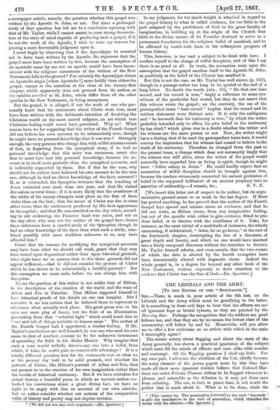THE POETRY OF THE FOURTH GOSPEL (To THE EDITOR OF
THE "SPECTATOR."] Sut,—I will not attempt to discuss what an interesting article on "The Fourth Gospel" truly says cannot be adequately dimmed in a newspaper article, namely, the question whether this gospel was written by the Apostle St. John, or not. But since a prolonged study of that question has. led me to a conclusion agreeing with that of Mr. Tayler, while I cannot assent to your strong denuncia- tion of the state of mind capable of producing such a gospel, if it be not the work of the Apostle, I wish to state my reasons for passing a more favourable judgment upon it.
I must begin by observing that if the Apocalypse be asserted not to have been written by the Apostle, the argument that the gospel must have been written by him, because the assumption of an apostolic name by one not an apostle would have been incon- sistent with the religious earnestness of the writers of the New Testament, falls to the ground.* For certainly the Apocalypse claims an Apostolic origin [where Apostolic?] more boldly than either the gospel, except in the assertion at the close of the twenty-first chapter, which apparently does not proceed from its author, or the epistles ascribed to St. John, which differ from all the other epistles in the New Testament, in being anonymous.
But the gospel, it is alleged, if not the work of one who per- sonally knew that his statements about Christ were true, must have been written with the deliberate intention of deceiving the Christian world on the most sacred subjects, an act which true Christian feeling could never have permitted. Why so? What reason have we for supposing that the writer of the Fourth Gospel did not believe his own account to be substantially true, though he might have no personal knowledge that it was true ? Strangely enough, the very persons who charge him with wilful misstatements of fact, in departing from the synoptical story, if he had no personal knowledge that this story was erroneous, assert also that he must have had this personal knowledge, because his ac- count is in itself more probable than the synoptical accounts, and is indirectly supported by them. But if this be the case, why should not its author have believed his own account to be the true one, although he had no direct knowledge of the facts narrated ? If, as is contended, the Synoptic& intimate that the teaching of Jesus extended over more than one year, and that He visited Jerusalem several times ; if it is more likely that the overthrow of the tables of the money-changers took place on the that of these visits than on the last ; that the arrest of Christ was due to some other cause than the excitement produced by His first appearance in the capital ; and that He was crucified on the day when, accord- ing to our reckoning, the Passover lamb was eaten, and not on the day after, why may not the author of the gospel have drawn these inferences from a careful study of the Synoptic; though he had no other knowledge of the facts than what such a study, com- bined possibly with some tradition unknown to us, may have afforded him ?
Grant that his reasons for modifying the synoptical accounts may have been what we should call weak, grant that they may have rested upon dogmatical rather than upon historical grounds, what right have we to assume that to him these grounds did not appear sufficient,—that he did not consider the picture of Christ which he has drawn to be substantially a faithful portrait ? But this assumption we must make before we can charge him with deception.
To me the position of this writer is not unlike that of Milton, in his description of the creation of the world and the state of Adam and Eve in Paradise. That Milton supposed himself to have historical proofs of his details no one can imagine. But I conceive it no less certain that he believed them to represent in substance what actually took place. His great poem was in his eyes not mere play of fancy, but the fruit of an illumination proceeding from that "celestial light" which could teach him to "ace and tell of things invisible to human sense." The author of the Fourth Gospel had, I apprehend, a similar feeling. If Mr. Tayler's conclusions are well founded, he was one who sank his own name in that of another, content to be the unknown instrument of spreading the faith in his divine Master. Why imagine that such a man would wilfully deceive any one into a belief, from which, if false, he could gain no conceivable advantage ? It is a totally different question how far his statements rest on what we at the present day hold to be solid grounds, and whether his portrait of Christ, like Milton's portrait of Adam and Eve, does not present to us the creation of his own imagination rather than the results of historical testimony. But if we have mistaken for actual history a beautiful poem in which an ancient author em- bodied his convictions about a great divine fact, we have no right to be angry with him on account of our own mistake. Let us rather consider whether our notions of the comparative value of history and poetry may not require revision.
• f We did not use any such argument.—D. Spectator.] In my judgment, far too much weight is attached in regard to the gospel history to what is called evidence, far too little to the part assigned by the providence of God to the great faculty of imagination, in building up at the origin of the Church that faith in the divine nature of its Founder destined to serve as a permanent foundation for the religious belief of mankind, and to be affirmed by world-wide facts in the subsequent progress of human history.
This, however, is too vast a subject to be dealt with here. I confine myself to the charge of wilful deception, and of this I say there is no proof at all. In truth, the accusation rests upon the assumption that the gospel ascribes itself to the Apostle St. John, as positively as the belief of the Church has ascribed it.
But this is not the case, as Mr. Tayler has well shown (p. 163), though in a passage rather too long to be quoted at the end of a long letter. No doubt the words (xix., 35), " He that saw bare accord, and his record is true," imply a reference to some eye- witness of the particular fact stated, but they do not assert that this witness wrote the gospel ; on the contrary, the use of the preterperfect tense "bare record" implies that the record and its written statement were distinct acts. It is only the ambiguous and "he lmoweth that his testimony is true," by which the writer probably intended only to affirm his own belief in the testimony he has cited,* which gives rise to a doubt whether the writer and his witness are the same person or not. Now, the writer might have a feeling that if he used the preterperfect tense here, it would convey the impression that his witness had ceased to believe in the truth of his testimony. Therefore he changed from the past to the present tense, a change which does not necessarily imply that the witness was still alive, since the writer of the gospel would assuredly have regarded him as living in spirit, though he might have "fallen asleep in Jesus." He could hardly expect that an accusation of wilful deception should be brought against him, because his readers erroneously converted his earnest profession of belief in the supposed fulfilment of an ancient prophecy into an
assertion of authorship.—I remain, &c., E. V. N.
[We insert this letter out of respect to its author, but its argu- mentative ground seems to us weak in the last degree. If Baur has proved anything, he has proved that the author of the Fourth Gospel lays special and minute stress on evidence, and that he did not write, as Milton wrote, from any imaginative feeling, but out of the specific wish either to give evidence fitted to pro- duce belief, or to deceive with the semblance of it. Take, for instance, as the most trivial of a multitude of instances, the utterly unmeaning, if unhistorical, "Arise, let us go hence," at the end of the fourteenth chapter, interrupting the line of a discourse of great depth and beauty, and which no one would have inserted into a freely composed discourse without the intention to deceive. Mr. Tayler himself admits, and even asserts, that the two events of which the date is altered by the fourth evangelist have been intentionally altered with dogmatic views. Indeed the whole gospel is, in a degree far beyond any other book of the New Testament, written . expressly to draw attention to the evidence that Christ was the Son of God.—En. Spectator.]































 Previous page
Previous page